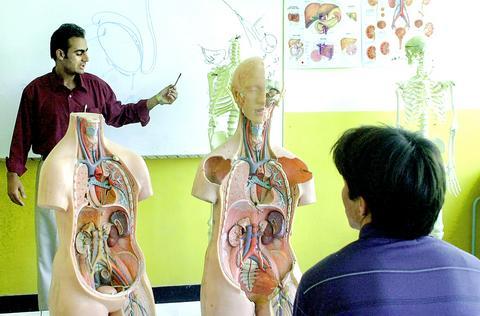Armed with shovels, bags and flashlights, five students creep through a dark Kabul cemetery on a gruesome midnight hunt they hope will help them in their studies.
Lacking cash to buy medical skeletons, the medical students have been forced to extreme measures in order to continue the lessons they hope will turn them into Afghanistan's next generation of doctors.
With more than 80,000 people killed in the 1992-1996 civil war, many of the victims were hastily buried in this west Kabul cemetery and it is their bones the students search for to help them learn anatomy.

PHOTO: AFP
"It was a scary and risky thing to do," one of them said. "But we had no other choice, we were told we could not attend the next anatomy lesson if we didn't have skeletons.
"We knew we would have few facilities or permission to work on bodies for autopsy at our university, but at least by digging up graves we can find skeletons," he said.
Much has changed in Afghanistan since the fall of the hardline Islamic Taliban regime in late 2001, but for medical students, procuring a skeleton remains a major problem.
The Japanese government recently donated some much-needed anatomical models to Kabul University, including a male and a female skeleton and models of musculature and other organs.
But medical students still need to buy or otherwise obtain a skeleton for use during their course, an academic at the university's Medical Institute who requested anonymity said.
Lacking the funds to buy a set of bones, many students are forced to turn to desperate means to supply their need, second-year student Saleh Ahmad confirmed.
And outside the capital the situation is similar in medical schools in places like eastern Nangarhar.
"I still have my skeleton that me and my friends got from digging in Nangarhar province," first-year medical student Mohammed Rafi said. "Most students still have to provide skeletons for themselves."
Mohammed Shafi, who took part in a midnight skeleton grab four years ago, said then their institute did not have a single skeleton and they had little choice but to rob a grave and risk heavy punishment if caught by the Taliban.
Apart from the risk of being caught, their efforts were sometimes in vain.
"First we opened three graves and that was a useless effort -- they were too old and the bones had all worn out so we had to open several others," said Mohammed Homayoon. "Then we opened four graves and managed to get four sets of skeletons," he said.
Some of the bones bore the scars of the war-ravaged country's violent past.
One of the skulls they dug up was totally blackened, indicating the victim had been burned, he said.
"God knows how cruelly he was killed by fighters in the civil war," he said.
Once they had the bones in their possession, the students then had to clean, sterilize and varnish them. Without professional skills or equipment they undertook the grisly task in their homes.
"I was not aware that this boiling skeleton would make a terrible smell," Shafi said.
"My mother came out to the backyard and saw the skull and bones boiling in the pan with this terrible smell and when saw me and my friend standing there she immediately fainted."

VAGUE: The criteria of the amnesty remain unclear, but it would cover political violence from 1999 to today, and those convicted of murder or drug trafficking would not qualify Venezuelan Acting President Delcy Rodriguez on Friday announced an amnesty bill that could lead to the release of hundreds of prisoners, including opposition leaders, journalists and human rights activists detained for political reasons. The measure had long been sought by the US-backed opposition. It is the latest concession Rodriguez has made since taking the reins of the country on Jan. 3 after the brazen seizure of then-Venezuelan president Nicolas Maduro. Rodriguez told a gathering of justices, magistrates, ministers, military brass and other government leaders that the ruling party-controlled Venezuelan National Assembly would take up the bill with urgency. Rodriguez also announced the shutdown

Civil society leaders and members of a left-wing coalition yesterday filed impeachment complaints against Philippine Vice President Sara Duterte, restarting a process sidelined by the Supreme Court last year. Both cases accuse Duterte of misusing public funds during her term as education secretary, while one revives allegations that she threatened to assassinate former ally Philippine President Ferdinand Marcos Jr. The filings come on the same day that a committee in the House of Representatives was to begin hearings into impeachment complaints against Marcos, accused of corruption tied to a spiraling scandal over bogus flood control projects. Under the constitution, an impeachment by the

China executed 11 people linked to Myanmar criminal gangs, including “key members” of telecom scam operations, state media reported yesterday, as Beijing toughens its response to the sprawling, transnational industry. Fraud compounds where scammers lure Internet users into fake romantic relationships and cryptocurrency investments have flourished across Southeast Asia, including in Myanmar. Initially largely targeting Chinese speakers, the criminal groups behind the compounds have expanded operations into multiple languages to steal from victims around the world. Those conducting the scams are sometimes willing con artists, and other times trafficked foreign nationals forced to work. In the past few years, Beijing has stepped up cooperation

Exiled Tibetans began a unique global election yesterday for a government representing a homeland many have never seen, as part of a democratic exercise voters say carries great weight. From red-robed Buddhist monks in the snowy Himalayas, to political exiles in megacities across South Asia, to refugees in Australia, Europe and North America, voting takes place in 27 countries — but not China. “Elections ... show that the struggle for Tibet’s freedom and independence continues from generation to generation,” said candidate Gyaltsen Chokye, 33, who is based in the Indian hill-town of Dharamsala, headquarters of the government-in-exile, the Central Tibetan Administration (CTA). It